Phang at 2015 Sundance
You were at Sundance
in 2008 with your feature film Half-Life,
and now you are back in 2015 with Advantageous.
What has changed about Sundance since then? What has remained the same? As an
Asian American filmmaker, what are your thoughts on the current landscape of
Asian American media? Where has it been and where do you think it still needs
to go?
When
I went there with Half-Life there was
a worldwide financial crisis happening, so few companies were buying films. It was pretty bleak for indie film and everyone was concerned it was
the end! This year, there's been a strong interest in quality independent filmmaking. I'm very pleased for
our audiences and the filmmakers. I think thoughtful media provokes healthy discussions and enriches
our culture. Asian American media currently seems to be experiencing an
upswing. We need our audiences to keep expanding and demonstrate their desire
for Asian American voices, in order to keep filmmakers putting Asian
American-driven stories out into the world.
You based the feature Advantageous off a multiple award-winning short film of the same
name released in 2012 and done for PBS's FUTURESTATES series. How did you find
the process of expanding the short film into a feature?
I was influenced by Age of
Innocence, Mad Men, Battlestar Galactica and Ghost in the Shell. In Age of Innocence and Mad Men, women wrestle
with their social position and class issues. All of these shows
follow characters who are uncomfortable in their position and
dissatisfied with the purpose that their world has assigned to them.
When I developed Gwen and Jules for the "Futurestates" short, I was recalling my own mother's devotion as she raised me in trying
circumstances. There was a time when she had so little help and no time for
herself, but she did all she could for me. She worked three
shifts and only slept when I was at school.
In expanding the short into a feature, Jacqueline Kim and I discussed
Gwen's past relationships, her fractured family background, and Gwen's
unspoken desire to slow down and escape the pressures of a fast-paced society.
After production I worked extensively with VFX Art Director Jean Elston to develop a look for our future cities and
technologies. Execution of these concepts fell on Catherine Tate, Ricardo
Marmolejo, and Jason Patnode, working with a talented group of VFX and CG artists.
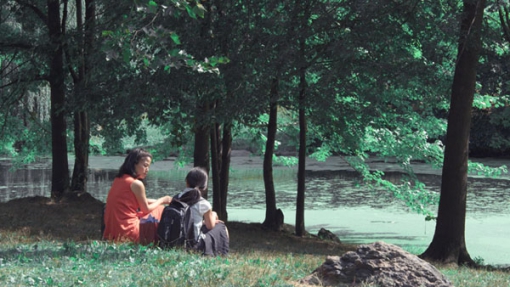
Sci-fi is tough since
you have to come up with a complete set of "rules" for your world:
what was that process like?
Working
with Jacqueline Kim on the feature, we decided to pursue the notion of the
Neo-traditionalist society which I alluded to in the short, where traditional
gender roles were experiencing a resurgence due to an economic crisis. We drew
from true perspectives on parenting and research about the future of
employment. I also wanted to posit a future where terrorism was so
commonplace, no one is afraid of it.
The reason this felt like a real possibility for me is that in some circles I
have directly experienced a (dangerous) reactionary nostalgia for "simpler
times" when gender roles were more defined, and women's primary charge in
life was to be attractive to men. I've personally heard people yearn for the days when women were
satisfied in supporting roles, sans ambition that could directly compete with
men. It feels a little like the allure of the series Mad Men, which
explores the tension of gender roles. We also drew from true perspectives on parenting and research about the future of employment. And I wanted to posit a future where terrorism was so commonplace, no one was afraid of it.
Further on the topic
of expanding the short into a feature, I enjoyed the additional scenes with Ken
Jeong. I thought his acting was subtle and skilled and frankly, I would love to
see him play more "indie roles.”
Ken was our
first choice. Jacqueline had seen a particularly nuanced performance
moment he had made in one of the Hangover
movies and sensed the intelligence in his acting. Ken responded extremely well to the
short film. He identified with Gwen's character because he is a father of twin
girls. As a parent, Ken connected with the universal importance of this story's ideas to the future of girls and the future
of women, so he came on as a producer to support the story and its
completion. And it was his first dramatic role, and he was wonderful to
work with. He also helped us keep the set fun and kept us laughing through the stress of our time constraints.
The exceptional music
score from Timo Chen I also enjoyed - what was working with him like?
Timo Chen and I
worked closely for a year. I wanted to get a jump on creativity, and so did he.
He built a library of innovative sounds by hand, employing
everything from a toothbrush to a vibrator. He created his own
instruments in order to develop unique sounds for this soundtrack that was
meant to bring textures of futurism and evoke a classical and romantic feeling as well. We can't forget Richard Kim's original Viola
improvisations though. He also played a huge part in the film's musical
textures.
I also thought the cinematography from Richard
Wong was excellent. How was working with him?
Richard
Wong is incredibly talented. We worked together closely during principal
photography. And Richard was always exploring compositions when I was working with
our cast. He would find beautiful masters on our
simple sets. It was a great collaboration because if we came to a location
that I hadn't had enough time to prep for, he would come up with ideas while I
was dealing with art, costume, vfx, and makeup and the rest of the production
concerns. His strategic, gorgeous lighting work with the help of Seng Chen was exquisite. Seng also
shot our LA Unit and VFX unit for the hologram headpieces. We have to remember that a lot of
great footage was also shot by Ming Kai Leung, who was wonderful to work
with as well.
Any stories from set?
It was all wonderful. We formed a strong family in our
crew and cast to get through all of this. One of our camera assistants,
Richard Sue, knew the script by heart from beginning to end, and was able to quote it verbatim off-set in a kind of post-modern way. He helped us a lot in post as well, and his special brand of humor kept my editor Sean and myself energized through all our work.
On an inspiring front: Our incredible producer Theresa
Navarro was able to secure the gorgeous Ladies Tea Room at the Prince George
as a location. They gave us a decent break on the fee because the core purpose
our story was aligned with their organization's purpose-- to serve vulnerable
people who are homeless or families in need of housing.
What is next for the
film, and what would you say to fans of the short?
TBD,
but we will screen in San Francisco, LA, and New York for sure. I would say to fans of the short that they
should be ready to learn some unexpected things about Gwen's past life, and glean
more about a strange future.
What is next for you?
Working on any interesting upcoming projects that you are at liberty to
discuss?
I'm developing a
slate of films with Advantageous head producer Robert Chang through our new partnership Good Neighbors
Media. One of them involves a climate scientist and looks at the past, present,
and future of our ecosystem, and the challenges to science in today's
world. We're also developing a modern romance, and an adaptation
of a well-known novel with a potentially groundbreaking approach.






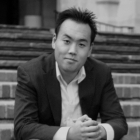
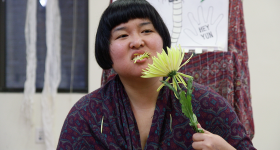
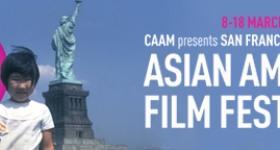
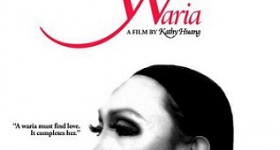
Comments